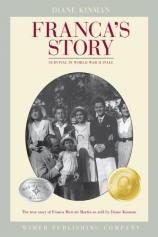Reading Group Guide
Discussion Questions
Franca's Story: Survival in World War II Italy

1. As a dictator, one of Mussolini’s accomplishments was that he “made the trains in Italy run on time.” Later, after the war began, he was considered Hitler’s puppet. Why did Mussolini decide to align Italy with Hitler’s Germany?
2. By her nature, Franca wanted to dance and sing, yet once the war started, she felt that she should hide when she did it because everyone else was so sad. Have you ever been through a situation similar to this one? How did you cope with your feelings?
3. The Facists destroyed paintings by the students in Franca’s art class, but not the masterpieces in the Uffizi. What is Facism about? Why do you think the masterpieces survived?
4. Why did Franca and her family have to go to the Post Office to answer the phone?
5. How do the Mercati family dynamics in 1930-40’s differ from yours?
6. Why were the railroad stations and tracks targets for bombing?
7. When Franca and her father visited the Pope, they were served tea with sugar and milk and cakes. Franca asked her father why the Pope had food when everyone else was hungry. Should the Pope have shared his food? Why or why not?
8. Franca and Lilly found a wounded British pilot in the park and rescued him. Why was this a dangerous thing to do?
9. Hans tells Fosco that he loves him as a brother, yet his training since the age of three was so intense that, if ordered, he would kill him without question. Discuss the early training methods used by the Nazi regime to build a superior race of people.
10. Franca escaped with Herr Doctor to return to Pianore. Do you think the planes were trying to bomb their ambulance, or were they aiming at the road? Why?
11. Why did Elena want everyone to call her “Aunt Elena” instead of Princess Elena? Why did she fill Pianore with so many people?
12. As the family watched, all of their belongings were destroyed in the bombing of the home in Viareggio. If you had just 5 minutes to grab your things, what would you bring with you?
13. In the middle of the war, there were severe shortages of food and things we take for granted such as electricity or gasoline or soap. Without soap, people washed with the water poured over ashes from the fireplace; wore layers of clothing to keep warm; rode bikes without rubber on the rims of the wheels so the Germans wouldn’t take them. The elderly citizens at Pianore spent long cold dark evenings huddled together in one large room for warmth, entertaining each other by singing or telling stories. Franca wore the same pair of Ferragamo loafers for 4 years; her father patched the soles using pieces of leather from Aunt Elena’s desk set. How do you imagine your life might change under these circumstances?
14. Franca felt special, being born so much later than all of her siblings. Her recurrent thought about her aging parents was that she was born late in their life because “God sent me to them to protect them.” Do you think that helped her survive? Why?
15. What happened to Italy in 1944 that made them switch allegiance to the Allies? (p.159)
16. Why did it cause such confusion among the Italian citizens and soldiers?
17. In 1944, the Nazi SS killed 560 Italian villagers at Sant’ Anna, a few miles from Capezzano, and burned the bodies. The massacre was one of the worst in a series of atrocities by Nazi troops in northern Italy. In 2006, 10 of these Nazis were tried in-absentia and convicted for the crime. Although these officers will never be imprisoned, Italian citizens felt justice had been done. Do you feel the trial was an appropriate way to settle the matter?
18. In celebration of Christmas, the residents at Pianore took apart the curtains and pillows to make gifts. Franca and Lilly read recipes to each other to savor the flavors in their imagination. What other things do people do to survive, physically and creatively?
19. How did the farms that Franca visited for food differ from our idea of a farm?
20. How did Franca’s ideal family life change? If there had not been a war, what changes would you have expected to see in the family dynamics?
21. Franca maintains a deep belief that God would protect her throughout the war so that she could help her parents. Have you experienced something similar while going through a difficult situation?
22. How has this book affected your understanding of the role of Italy during World War II?
Franca's Story: Survival in World War II Italy
- Publication Date: April 30, 2008
- Paperback: 204 pages
- Publisher: Wimer Publishing Company
- ISBN-10: 0976392925
- ISBN-13: 9780976392927






